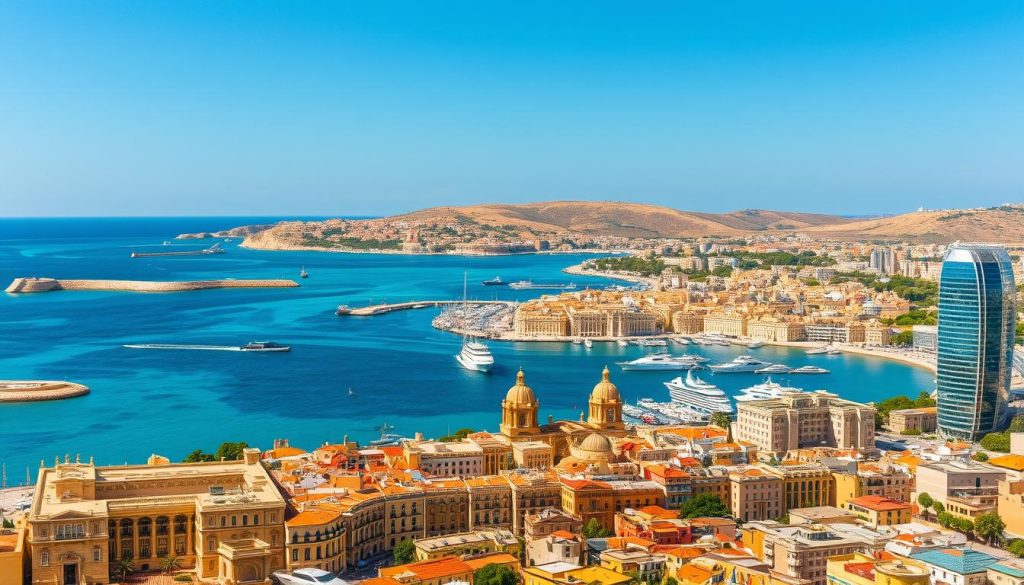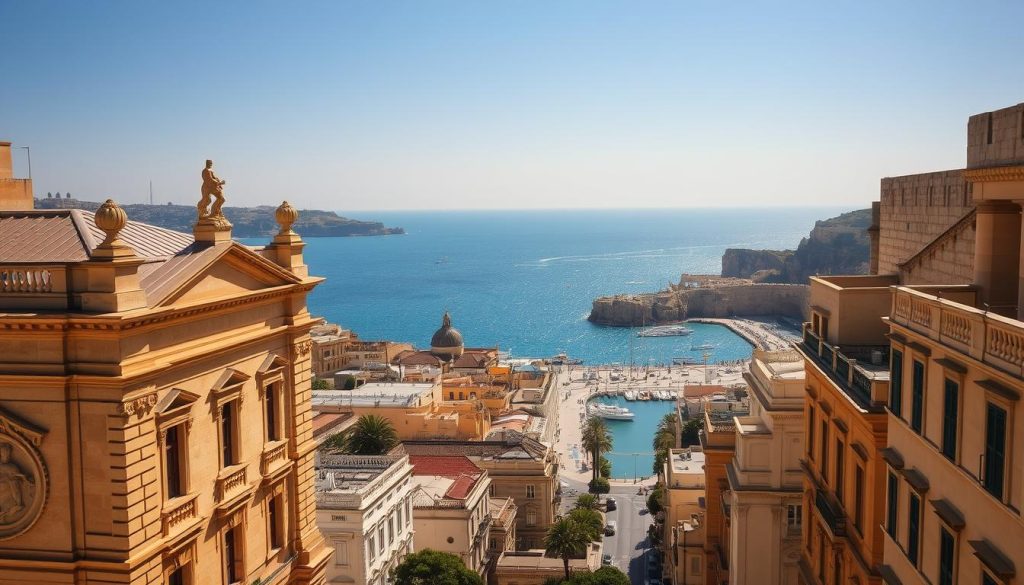Malta is a unique spot for businesses, thanks to its location and economic environment. It’s between Europe and North Africa. This makes it a great place for entrepreneurs looking to grow.
Malta’s economy is growing fast, and it follows European Union rules. This is good news for businesses. We’ll look at why Malta is a top choice for starting and growing a business.
Introduction to Business in Malta
To understand business in Malta, we must look at the economy and growth areas. The Malta economy has changed a lot over time. It has a growing GDP, thanks to sectors like finance, tourism, and gaming.
These sectors offer great insights for investors and entrepreneurs. They show how Malta is a good place for business.
Overview of Malta’s Economy
Malta’s economy has grown a lot in recent years. It has shown it can adapt and stay strong. The country’s GDP growth is better than the EU average.
Foreign direct investment has also increased. This shows people trust the Maltese market. It opens up many business opportunities.
Key Sectors Driving Growth
Some sectors in Malta are key to its economy. The financial services industry is very strong. It attracts international companies because of its good rules.
The gaming sector is also booming. Malta is a big player in online gaming. Technology and pharmaceuticals are promising too. They offer chances for investment and growth.
| Sector | Contribution to GDP | Growth Potencial |
|---|---|---|
| Financial Services | 12% | High |
| Gaming | 10% | Very High |
| Information Technology | 8% | High |
| Pharmaceuticals | 7% | Moderate |

Benefits of Establishing a Business in Malta
Investing in Malta offers many benefits for entrepreneurs and big companies. It has low corporate tax rates and easy access to EU markets. This makes Malta a great place for businesses to grow.
Attractive Corporate Tax Rates
Malta has some of the lowest corporate tax rates in Europe. The standard rate is 35%, but many businesses pay less. This is because of tax refunds and incentives.
This makes Malta very attractive to foreign investors. It helps companies keep more of their profits. This encourages growth and new opportunities.
Access to European Markets
Malta is a key entry point to the European Union. It gives businesses access to over 500 million customers. Setting up in Malta means benefiting from the local economy and easy trade across Europe.
This is important for logistics and trade. It helps companies reach customers and partners in the EU easily.

The Legal Framework for Businesses in Malta
Knowing the legal setup in Malta is key for any business owner. The rules cover many areas, making sure businesses follow the law. We’ll look at how to register a business, the documents needed, and the time it takes. We’ll also talk about trade licenses, depending on the business type.
Business Registration Process
Starting a business in Malta involves a few important steps. First, we need to choose the right legal form, like a sole trader or a company. Each choice has its own rules and responsibilities in Malta.
We collect important documents, like:
- Identification for directors and shareholders
- Proof of address
- Details of what the business will do
Registration usually takes a few weeks, depending on the business’s details. After registering, the business gets a unique number. This number is vital for official talks.
Trade Licenses and Permits
Some businesses need special licenses to operate legally in Malta. The license type varies, from a basic trading license to specific ones for sectors like hospitality or healthcare.
We should talk to local authorities or legal experts to get the right licenses. This follows Malta’s laws and helps our business run smoothly.

Regulatory Environment in Malta
The regulatory environment in Malta is key to the business scene. Knowing the compliance rules helps companies follow local and EU laws. This ensures they operate smoothly. We’ll look at the main rules for reporting and protecting intellectual property rights in Malta.
Compliance and Reporting Requirements
Malta’s businesses must follow strict rules to keep things transparent and fair. The annual financial report is a key document for showing a company’s financial health. Companies also need to do regular audits to meet the Malta Financial Services Authority (MFSA) standards.
Every business must also know their tax duties and submit on time. Not doing so can result in big fines.
Intellectual Property Protection
Protecting intellectual property rights in Malta is essential for businesses. The laws cover trademarks, copyrights, and patents. This helps companies protect their innovations.
Companies can register trademarks with the Intellectual Property Office in Malta. This guards their brand. Copyrights give creators exclusive rights to their work. Patents protect inventions. These protections help businesses innovate and stay ahead in their fields.

Grasping the regulatory environment in Malta helps businesses deal with complex rules. This builds a solid base for growth and success.
Banking and Financial Services
Malta’s banking scene is varied, catering to businesses with different financial needs. It has both traditional banks and new fintech options. Knowing these choices is key for good financial management and smooth operations.
Local Banking Options for Businesses
In Malta, local business banking offers a wide range of banks. They cater to all sorts of business needs. Key banks provide business accounts, loans, and credit facilities made for the Maltese market.
- Access to competitive interest rates on loans
- Support for start-ups through specialised business accounts
- Tailored financial advice to optimise business strategies
These services help businesses manage local transactions and follow rules. Strong customer support ensures quick help with any questions.
International Banking Facilities
For international banking, Malta offers many facilities for global trade and investment. Services include foreign currency accounts and easy international transactions. These are vital for businesses working across borders.
| Feature | Local Banking | International Banking |
|---|---|---|
| Account types available | Business accounts, savings accounts | Foreign currency accounts, transactional accounts |
| Transaction fees | Standard fees apply | Variable based on currency and transaction size |
| Global access | Limited to local operations | Extensive global reach |
| Support for cross-border payments | Basic support | Dedicated support for seamless transactions |
In conclusion, Malta’s financial services and banking options make it a great place for businesses. It balances local needs with global capabilities. This makes Malta perfect for businesses aiming to succeed in today’s world.
Labor Market and Workforce
Understanding Malta’s labour market is key for businesses. The workforce is diverse, with education and skills playing a big role. This section looks at education and skills, showing how they meet industry needs.
Education and Skill Levels
Malta’s education system is strong, preparing students for the workforce. The country has a high literacy rate and many people have tertiary education. The government invests in vocational and higher education to meet market needs.
There’s a big focus on STEM fields. This helps the workforce adapt to new challenges.
Employment Regulations
Knowing Malta’s employment laws is vital for businesses. The country has rules on minimum wage, working hours, and employee rights. These ensure a fair work environment.
The minimum wage is regularly checked to keep workers’ living standards good. Rules on working hours and overtime are also in place. This is important for employee well-being.
Being aware of these rules helps businesses avoid legal issues. It also builds a positive work culture.
Networking and Business Resources
Starting a business in Malta needs more than just a good plan. It also requires the right connections. Networking in Malta can open up many opportunities. By joining local business groups and the Malta Chamber of Commerce, entrepreneurs can get the support they need.
Business Associations and Chambers of Commerce
Business associations in Malta are very important. They offer a place for networking, learning, and working together. The Malta Chamber of Commerce is a key player, with events, training, and updates for businesses.
These groups help startups meet established companies, partners, and customers. This creates a great environment for growth.
Government Support for Startups
The Maltese government supports new businesses a lot. They offer grants, funding, and mentorship. These help startups deal with the challenges of starting out.
By using these resources, entrepreneurs can build a strong base for their business.
| Type of Support | Description | Benefits |
|---|---|---|
| Grants | Financial help for specific projects | Reduces costs, allows for growth investment |
| Funding Initiatives | Loans and financial support | Increases cash flow, supports growth |
| Networking Events | Events for businesses to meet | Helps make connections, promotes partnerships |
| Training Programmes | Workshops for skill development | Improves knowledge, enhances business skills |
Challenges of Doing Business in Malta
Starting a business in Malta comes with its own set of challenges. The local scene is marked by a lot of red tape, which can really slow things down. You’ll face long licensing times and a bunch of complex rules that can make it hard for new businesses to get started.
There’s also a lot of competition in different industries. This can make it tough to get a foothold in the market. It’s important to understand these challenges to succeed.
Navigating Bureaucracy
Dealing with the bureaucracy in Malta can be a big problem. It can make your business slow and affect your plans. Getting the right permits and licenses can take a long time.
The rules and procedures are often complicated. You might need to hire local experts to help you out. This can add extra costs for new businesses.
Competition in Key Industries
Malta’s markets are very competitive, mainly in tourism, finance, and gaming. It’s hard for new businesses to stand out because there are already so many players. Knowing the market well and finding something unique to offer is key.
Conclusion: Evaluating Malta as a Business Destination
Looking at Malta for business, it’s clear it’s a great choice for entrepreneurs. The low corporate tax rates and its spot in Europe attract investors. The government’s support and strong infrastructure also make it a good place to do business.
But, starting a business here isn’t without its challenges. Dealing with red tape can be hard, and the market can be competitive. It’s key to know these things before diving in.
Malta is a mix of good and bad for business. If you’re ready to face its challenges, it could be very rewarding. Weighing the pros and cons will help you decide if Malta is right for your business.







